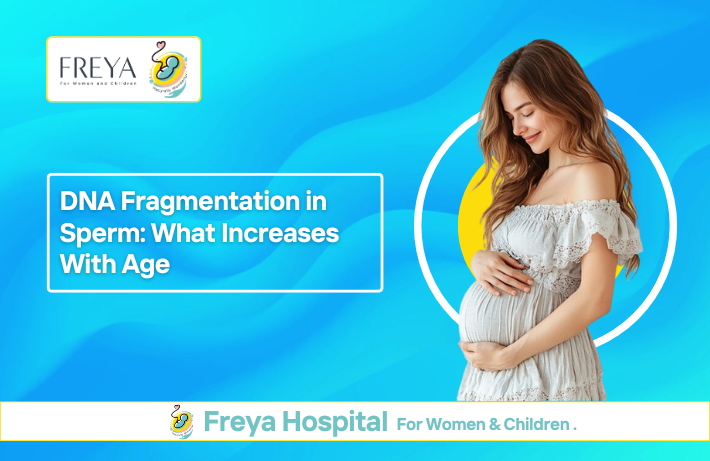Understanding male fertility is an ongoing journey, and one crucial aspect that often goes unnoticed is DNA fragmentation in sperm. As men age, the quality of their sperm can decline, and this decline includes an increase in DNA fragmentation—a factor that can impact fertility and the chances of healthy conception. This blog explores what DNA fragmentation in sperm means, what increases with age, and why it matters, particularly in understanding the dynamics of fertility and pregnancy outcomes. Also, for couples aiming to conceive with the hope of normal deliveries in Ranchi, it’s important to be aware of these biological factors that come into play.
What Is DNA Fragmentation in Sperm?
DNA fragmentation refers to the presence of breaks or damage in the DNA strands within the sperm cells. Normally, DNA is tightly packed and intact, but when fragmentation occurs, the strands have single or double breaks. This damage can reduce the sperm’s ability to fertilize the egg and increase the risk of miscarriage or problems in embryo development.
Unlike other body cells, sperm cells have limited capacity for repairing DNA damage once produced. This makes them vulnerable to environmental and biological factors that can cause oxidative stress and other damages over time.
Causes of DNA Fragmentation
Several intrinsic and extrinsic causes lead to DNA fragmentation in sperm:
- Intrinsic Causes: During sperm development, abnormal chromatin packaging, defective apoptosis (programmed cell death), or genetic abnormalities may lead to DNA breaks.
- Extrinsic Causes: Exposure to toxins, infections, elevated testicular temperature, poor lifestyle choices (such as smoking and excessive alcohol), environmental pollution, and even certain medications can trigger DNA damage.
Among these, oxidative stress caused by an imbalance between free radicals (reactive oxygen species) and antioxidants is the leading cause. This oxidative stress damages sperm membranes and DNA, contributing significantly to fragmentation.
How Age Increases DNA Fragmentation
Age is a natural factor that correlates strongly with the increase in sperm DNA fragmentation. Research has shown that DNA fragmentation levels in sperm cells tend to rise as men grow older, especially after the age of 40. The reasons include:
- Accumulated Oxidative Stress: Over time, the body’s antioxidant defenses weaken, leading to more oxidative damage.
- Deterioration of Cellular Processes: Aging disrupts normal sperm production and maturation, increasing the likelihood of incomplete DNA repair mechanisms.
- Increased Apoptosis and Chromatin Abnormalities: Older sperm tend to have more irregular chromatin structure and increased cell death, resulting in fragmented DNA.
This increase in DNA fragmentation with age impacts male fertility by reducing sperm quality, lowering fertilization rates, and increasing the chance of miscarriage or unsuccessful IVF procedures.
How DNA Fragmentation Affects Fertility and Pregnancy
Sperm DNA fragmentation is often linked to infertility, recurrent pregnancy loss, and poor outcomes in assisted reproductive technologies (ART) like IVF or ICSI. High fragmentation damages the genetic material passed to the embryo, potentially causing developmental issues.
Couples facing fertility challenges should consider testing for DNA fragmentation as part of the male fertility workup. Treatments to reduce fragmentation may include lifestyle changes, antioxidant supplements, and medical interventions targeting underlying causes.
Importance for Normal Deliveries in Ranchi
Awareness about sperm DNA health is vital for families trying to conceive, especially those hoping for normal deliveries in Ranchi. Fertility clinics in the region emphasize comprehensive assessments including DNA fragmentation testing because normal deliveries often depend on a full-spectrum approach to reproductive health, starting from sperm quality.
Improving sperm DNA integrity through healthier lifestyle choices and medical advice not only aids conception but also supports healthier pregnancies, which can contribute to more normal deliveries in Ranchi. Couples are encouraged to seek fertility counseling as early as possible when planning a family.
Tips to Reduce DNA Fragmentation and Promote Fertility
- Maintain a balanced diet rich in antioxidants (fruits, vegetables, nuts).
- Avoid smoking, excessive alcohol, and recreational drugs.
- Reduce exposure to environmental toxins and heat stress.
- Manage chronic conditions (diabetes, infections) under medical supervision.
- Consider antioxidant supplements after consulting a healthcare provider.
- Regular moderate exercise improves overall sperm health.
- Consult fertility specialists for personalized testing and treatment.
Conclusion
DNA fragmentation in sperm is a crucial factor that increases with male age, affecting fertility and the potential for healthy conception. Recognizing this risk and taking preventive measures can significantly improve outcomes for couples trying to conceive, including those aiming for normal deliveries in Ranchi. By understanding sperm DNA health and its implications, individuals can make informed decisions to boost fertility and support successful pregnancies.
Fertility is a shared journey, and keeping male reproductive health in check is as important as female health. With modern testing and medical guidance, managing sperm DNA fragmentation is possible, leading to better reproductive success and joyful normal deliveries in Ranchi.
This blog hopes to shed light on this often overlooked aspect of male fertility and encourages proactive steps toward healthier reproductive futures.











